

Strength-Spotting Interviews: 20+ Questions and Techniques. How often have we asked ourselves: Who am I?
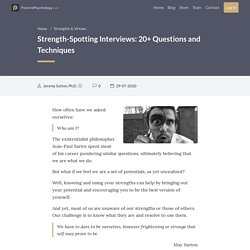
The existentialist philosopher Jean-Paul Sartre spent most of his career pondering similar questions, ultimately believing that we are what we do. But what if we feel we are a set of potentials, as yet unrealized? Strength-Based Leadership: 34 Traits Of Successful Leaders. Leaders throughout history have inspired, disappointed, empowered, enraged, challenged, and scared the people they serve.
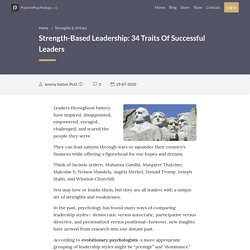
They can lead nations through wars or squander their country’s finances while offering a figurehead for our hopes and dreams. Think of Jacinda Ardern, Mahatma Gandhi, Margaret Thatcher, Malcolm X, Nelson Mandela, Angela Merkel, Donald Trump, Joseph Stalin, and Winston Churchill. You may love or loathe them, but they are all leaders with a unique set of strengths and weaknesses. In the past, psychology has found many ways of comparing leadership styles— democratic versus autocratic, participative versus directive, and personalized versus positional—however, new insights have arrived from research into our distant past. According to evolutionary psychologists, a more appropriate grouping of leadership styles might be “prestige” and “dominance.” Cultivating Strengths At Work: 10+ Examples and Ideas. Love?
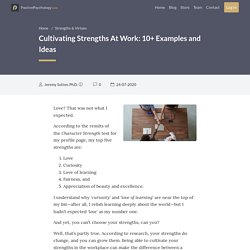
That was not what I expected. Personal Strengths & Weaknesses Defined (+ A List of 92 Strengths) In my work with young people, we often talk about their ideas of personal strengths and personal weaknesses.
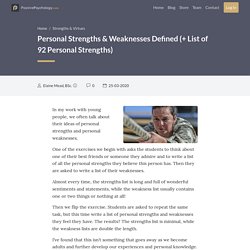
One of the exercises we begin with asks the students to think about one of their best friends or someone they admire and to write a list of all the personal strengths they believe this person has. Then they are asked to write a list of their weaknesses. Almost every time, the strengths list is long and full of wonderful sentiments and statements, while the weakness list usually contains one or two things or nothing at all! Then we flip the exercise. 7 Strength Finding Tests and Questionnaires You Can Do Today. If someone asked you to define yourself, what would your answer be?

Strengths are inherent potentials that influence our thoughts, emotions, and actions. They define who we are and determine our uniqueness. Wisdom, courage, perseverance, and humility are a few instances of the qualities we possess. In psychology, character strengths are defined as innate capabilities that allow us to overcome our thought blocks and encounter adversities with more positivity. What are Your Strengths and Why You Should List Them. Vulnerable Yet Stronger—The Paradox of Strength. “We are at our most powerful the moment we no longer need to be powerful.”
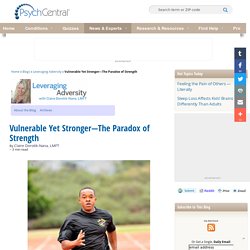
—Eric Micha’el Leventhal “No one ever gets through this life without heartache, without turmoil, and if you believe and have faith and you can get knocked down and get back up again and you believe in perseverance as a great human quality, you find your way.” The words of Diana Nyad, the first person to successfully swim the channel from Florida to Cuba, ring true. [i] Can You Map Your Talents and Character Strengths? Four Strengths Tools Based on Positive Psychology. The science of strengths is increasingly attractive to coaching professionals and organisations, spurred by scholarly research, popular books, and a growing range of strengths assessments and interventions.
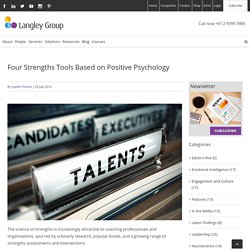
The strengths approach at the heart of positive psychology represents a paradigm shift for many workplaces and people. Instead of focusing on weaknesses or what is wrong—the deficit model—focusing on strengths builds on what people do well and can do better. It is informed by an assumption that people naturally want to discover, grow and develop their potential and that their positive qualities can be harnessed to enhance performance and wellbeing. Developing Employees’ Strengths Boosts Sales, Profit, and Engagement.
Should companies primarily focus on playing to the strengths of their employees or help them improve on their weaknesses?

This question is particularly important today, given low workplace engagement and higher expectations from workers about what a great job entails. Can A Strengths Coaching Approach Be Damaging? When it comes to using a coach to improve your performance at work, would you rather they focus on building your strengths or fixing your weaknesses?
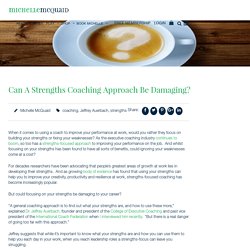
As the executive coaching industry continues to boom, so too has a strengths-focused approach to improving your performance on the job. And whilst focusing on your strengths has been found to have all sorts of benefits, could ignoring your weaknesses come at a cost? For decades researchers have been advocating that people’s greatest areas of growth at work lies in developing their strengths. Can You Change Your Strengths? For most of us, discovering our strengths – those things we’re good at and actually enjoy doing – sounds like a good idea.
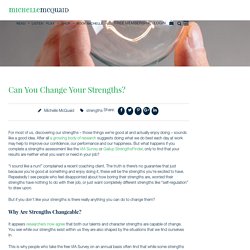
After all a growing body of research suggests doing what we do best each day at work may help to improve our confidence, our performance and our happiness. But what happens if you complete a strengths assessment like the VIA Survey or Gallup StrengthsFinder, only to find that your results are neither what you want or need in your job? “I sound like a nun!” Strong Callings.
Talents. Character Strengths. Engagement Psychology. Mental Strength. Strength. Unbalance. Get one's strength back. Informal Strengths Assessment: Simple Ways to Realise Strengths in People. Helping people realise their strengths enables you to get the best from them whatever the context. How to Play to Your Strengths.
Executive Summary Reprint: R0501G Most feedback accentuates the negative. During formal employee evaluations, discussions invariably focus on “opportunities for improvement,” even if the overall evaluation is laudatory. Let’s Get Serious about Playing with Our Strengths. October 25, 2017 by VIA Contributor · Most of us know that children learn through play, but so do teens and adults! Humans of every age learn best when given the opportunity to play and experiment with something new without being worried about making mistakes. We’re often told that to improve our performance and experience greater success, we need to play to our strengths. But it’s hard to play to our strengths without first having the opportunity to play with our strengths in a risk-free environment.
Doing something fun and new with your strengths at least once a week will not only deepen your understanding of them, but also help increase your sense of well-being and life satisfaction. Strengths Survivor – You’re stranded on a desert island with only your strengths to rely upon. Can’t decide which one of these activities to do? Remember, children are especially receptive to learning through games. Now let’s all get out there and start playing with our strengths. Character Strengths Poem. January 11, 2018 by VIA Contributor · Creativity is shaping your thoughts into something that you have never seen or heard before.
It’s letting your imagination go and start to soar.
Self-Image. Appreciative Inquiry. Testimonies.